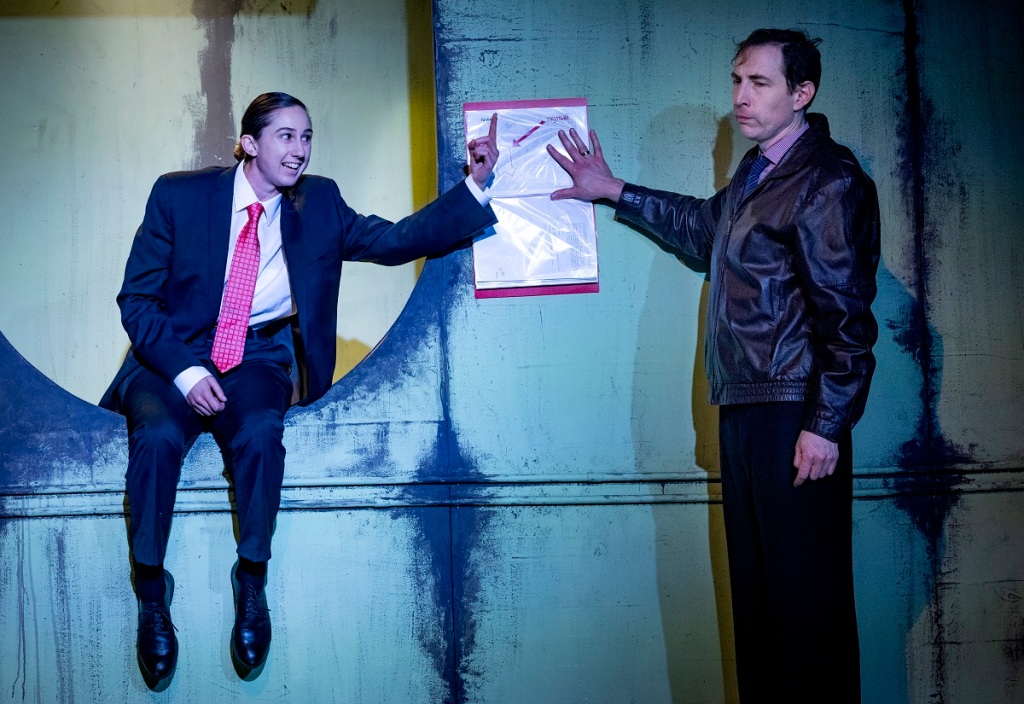What would you call this? A reportage play? A recent history play? Whatever you call it, it’s a happening genre. Recent events, covered by the media, become a work of theatre.
The reasoning is simple: what the media provides is problematic. The media throws information at us helter skelter, bit by bit, hour by hour, and then moves on. The media isn’t trying to help us make sense of the world; it’s simply trying to get our attention. It treats us like children; it shakes a rattle, it plays peek a boo. For those of us who have achieved object permanence, this can feel a little dissatisfying. I’m informed that such and such happened, but I often don’t know what happened before such and such, and I rarely find out what happens after. A lack of understanding of how motivations, actions and consequences interconnect is a recipe for disempowerment. The media purports to offer information, but often is only selling passivity and impotence.
Dramatists, and writers of other forms, have realised there’s a place for an extended narrative that makes sense of the helter skelter of the media, joining the before and after of an event into a coherent whole.
In 2017, Luke Harding wrote A Very Expensive Poison: The Definitive Story of the Murder of Litvinenko and Russia’s War with the West. In 2019, dramatist Lucy Prebble adapted it, presenting the story of Alexander Litvinenko, poisoned by Russian agents in London in 2006.

Of course, the challenge of this type of writing for theatre is that some of it will naturally be invention. Did Putin really say that? Fiction can be taken as fact. Prebble guards against this through the use of a playful meta-theatricality, reminding us to remain alert, that the passivity endemic to television viewing is no option.
The point of all this – apart from entertainment, and this play and this production are hugely entertaining – is to impart political insight. Sure, some of these insights may appear too obvious to earn that title. That expediency often trumps justice, that determination is necessary if justice is to be ultimately achieved, are assertions unlikely to enlighten anyone – but in any seriously engaged political life they bear repetition.
Other insights offered are more drama-ish. (Yes, a made up word.) By it I mean the insights that drama is particularly suited to give. These are often of the giving-voice-to-the-devil type. Several men whose ethics we might find reprehensible are given voice in this piece. One tells of Russia’s history of suffering, suggesting that our moral objections might, from another perspective, seem merely irrelevant self-indulgent scruples. Not for a moment does Prebble suggest that Litvinenko deserved to be murdered; her intention is clearly to indict a Russian regime capable of such an atrocity, and to critique Britain’s reluctance to seek justice. But it remains a valid point, that despite our deepest wishes, moral systems are not universal. To successfully live with others (other countries, other individuals) and to retain the hope that we might nudge the world a little closer to the ideal we desire, we need to know this.
Have I made all this seem rather heavy? It’s not. Prebble’s script is brilliant, and director Margaret Thanos’ production allows it to shine. With movement director Diana Paola Alvarado, Thanos gives a show brimming with pace, energy and pizazz.
Performances are excellent. Richard Cox as Alexander Litvinenko gives a moving portrait of the relationship between moral exertion and woe. Chloe Schwank as Marina Litvinenko beautifully portrays a journey from fear and frustration to strength and resoluteness. Tasha O’Brien as Putin is absolutely marvellous; she gloriously embraces the comic possibilities of the role while simultaneously presenting a character whose personal awkwardness and deep mistrust make a truly dangerous enemy.
Paul Gilchrist
A Very Expensive Poison by Lucy Prebble
at New Theatre until Sept 16
Image by Bob Seary
Leave a comment